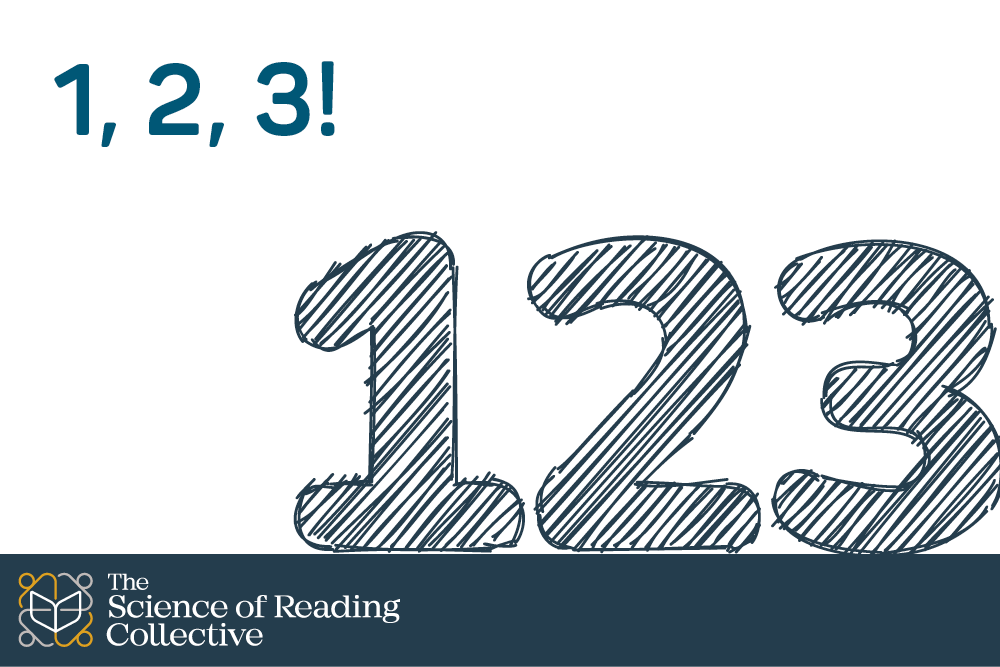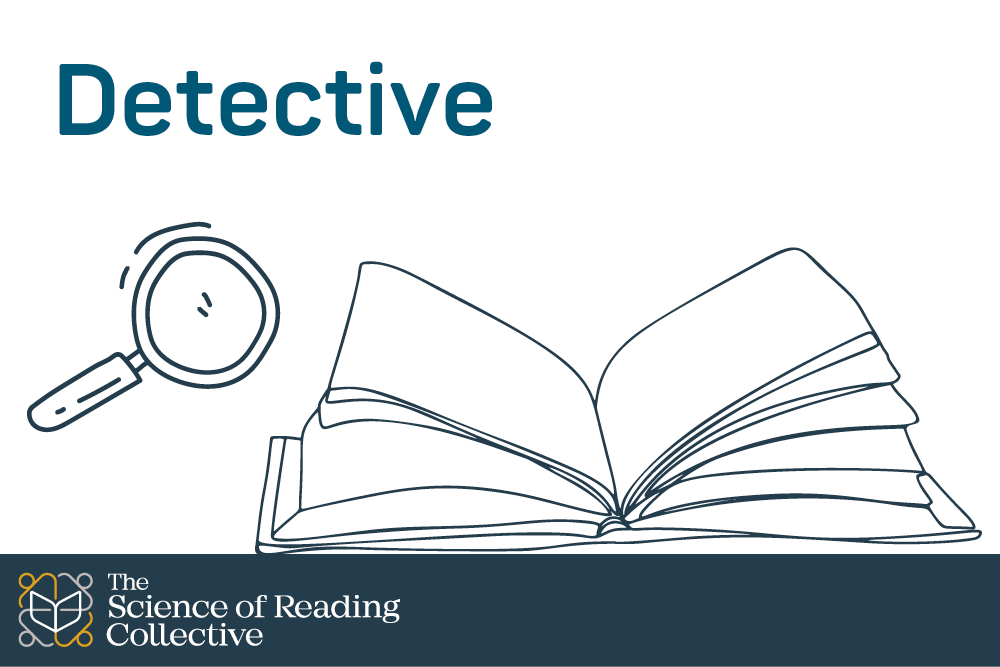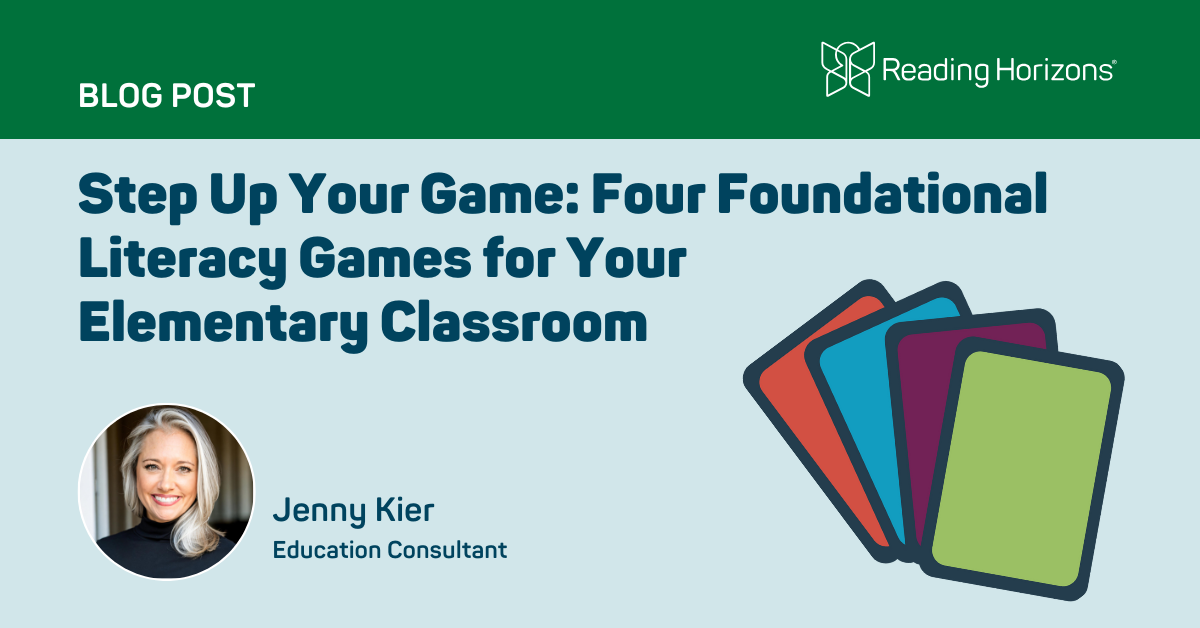
Jenny Kier, Reading Horizons Education Consultant
Whether solo or with others, on a table, screen, or field, almost everyone enjoys games. The idea of gameplay evolved naturally thousands of years ago because games fulfill our desire for the following:
- Social connection
- Cognitive and physical development
- Entertainment
- Strategy and competition
- Survival
- Expression of culture and identity
When it comes to reading games, students often forget they’re learning or reinforcing literacy skills because games are fun! Games can reinforce several literacy skills, including phonemic awareness, letter/sound correspondence, individual and combination letter identification and sound, and high-frequency words.
Games keep students motivated. Some games start fairly simple, making them easy for students to grasp and succeed at. This success breeds motivation. Students who are successful at gameplay will continue building on their knowledge and growing their skills.
Games don’t have to require pieces, parts, boards, lamination, scissors, and glue! How often have you played the ABC game, where everyone takes turns naming objects as you go through the alphabet? No materials required! And little to no materials means you can play these games anywhere.
Of course, you can’t have students play games all day long, but here are some great times to break into your toolbox:
- In the morning, before the bell rings
- During activity clean up
- When lining up for lunch
- As a review to gauge previous literacy skills before launching into a new one
- On the way to and from the playground
- During restroom breaks, as students are coming and going from the classroom
- During long stretches of exams to avoid cognitive fatigue
- Waiting for the bell to ring at the end of the day
- When students are in the car rider or bus line (with the group of students who are walkers)
- Indoor or outdoor recess
Let’s look at a few super easy games for students to play!
Games to Boost Phonemic Awareness and Letter/Sound Correspondence

1, 2, 3!
Objective: Phoneme isolation.
Materials: None
How to Play:
Say a three-letter word aloud (e.g., sun).
Ask students to listen carefully and think about the three sounds in the word.
Hold up one, two, or three fingers to indicate which sound they should identify:
One finger: Students say the first sound.
Two fingers: Students say the second sound (vowel sound).
Three fingers: Students say the third sound.
Only use three-letter words for this activity.
Example:
Say the word sun.
Hold up one finger: students should say the first sound, /s/.
Hold up three fingers: students should say the third sound, /n/.
Hold up two fingers: students should say the second sound (vowel), /u/.
Variation: Reverse the process. Tell students the word, give one of the three sounds, and then have students hold up their fingers to show if it is the first, second, or third sound.

G—My Name is Gary
Objective: Promote awareness of initial phonemes.
Materials: Alphabet Cards
How to Play: Give each student a letter from the Alphabet Cards. The first student states their letter name and then must follow the pattern from the example, thinking of names, places, and things that begin with that letter.
Example: _ B__—My name is __Byron___, and my friend’s name is __Betty___. We come from Brazil, and we like __balloons___.
Variation: This variation will lessen the cognitive load for kindergarten and special populations: M–My name is Matthew, and my friend is Martin.
Games that Promote Individual and Combination Letter Identification and Sound

Detective
Objective: Identify orthographic patterns.
Materials: Student library books, books from the classroom, decodable books, newspapers, magazines, small magnifying glasses (optional)
How to Play:
Hand out the text you have brought, or ask students to take out their library books. Have students “play detective” with their magnifying glasses. See who can spy a particular blend or digraph and be the first to stand up, ready to prove their detective work. For example, if students are looking for L-Blends, the first to find it would stand and say, “I found the pl blend in the word plug. It is at the beginning of the word.”
Variations:
- Students can look for letters when they first learn letter/sound correspondences, R-controlled vowels, syllable types, and more!
- This is a great station, too. Have students use their library book or a pre-printed page of text to identify and write “ten words with the short a vowel sound.”
Games to Practice High-Frequency Words

Swap and Switch
Objective: Practice and master high-frequency words.
Materials: Cards with high-frequency words printed on each one (enough for each student to have one), high-frequency words you’ve been learning about lately
How to Play:
Give every student a card with one high-frequency word. Students stand up, put a hand up (showing they need a partner), and partner up by giving their partner a high five.
Students take turns asking each other how to read the word on the card. If either gets the answer wrong, the person asking the question coaches before explaining the correct answer. Congratulations are given for successfully reading the word.
Once they can read both high frequency words, they trade cards and thank one another with a handshake or a fist bump.
Next, they raise their hands to find a new partner and begin the “Swap and Switch” process again.
Set a timer for 5–10 minutes to play this game.
Variations: Have the students use the Most Common Word in a sentence or have them try to spell the word!
You have the power to make learning fun! Games are a fantastic way to put instruction into practice and allow students to test their new skills. But just like anything else in life, moderation is key. Stop a game while students are still engaged; this leaves them wanting more! Games will lose their excitement and appeal if students play them too long.
If you sense frustration or fatigue during instruction, take a break. It might be time to play a game!
Find more games and a wealth of other resources in The Science of Reading Collective!

